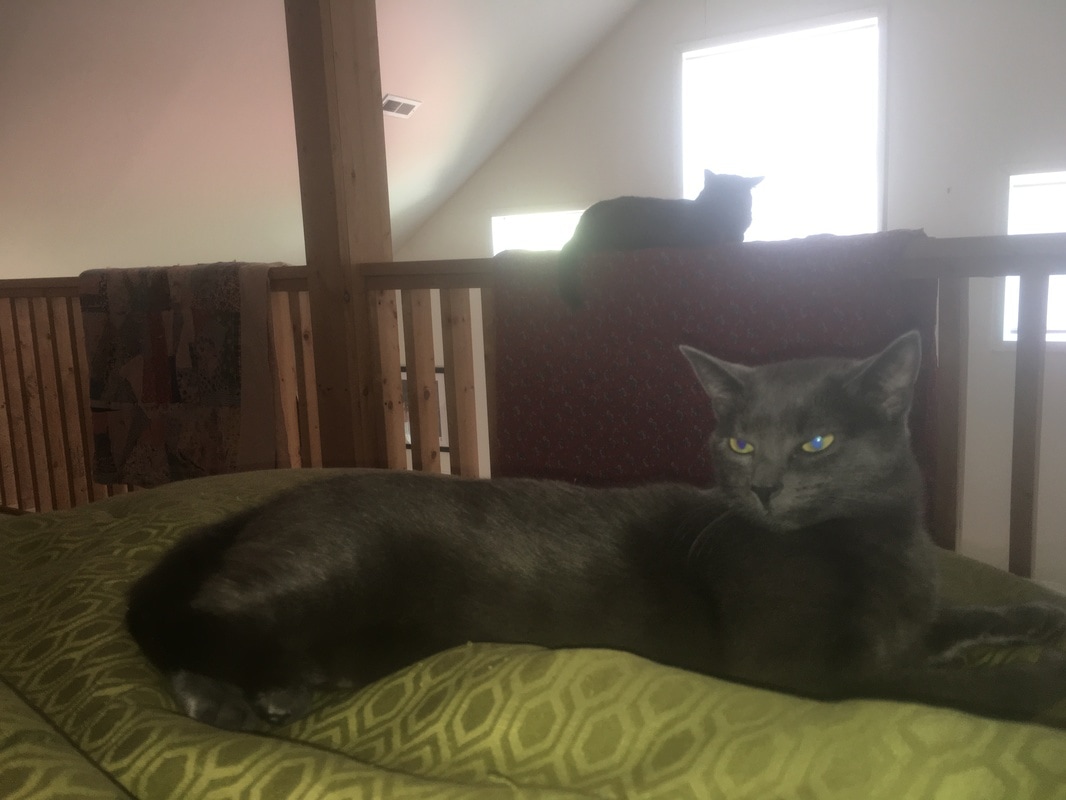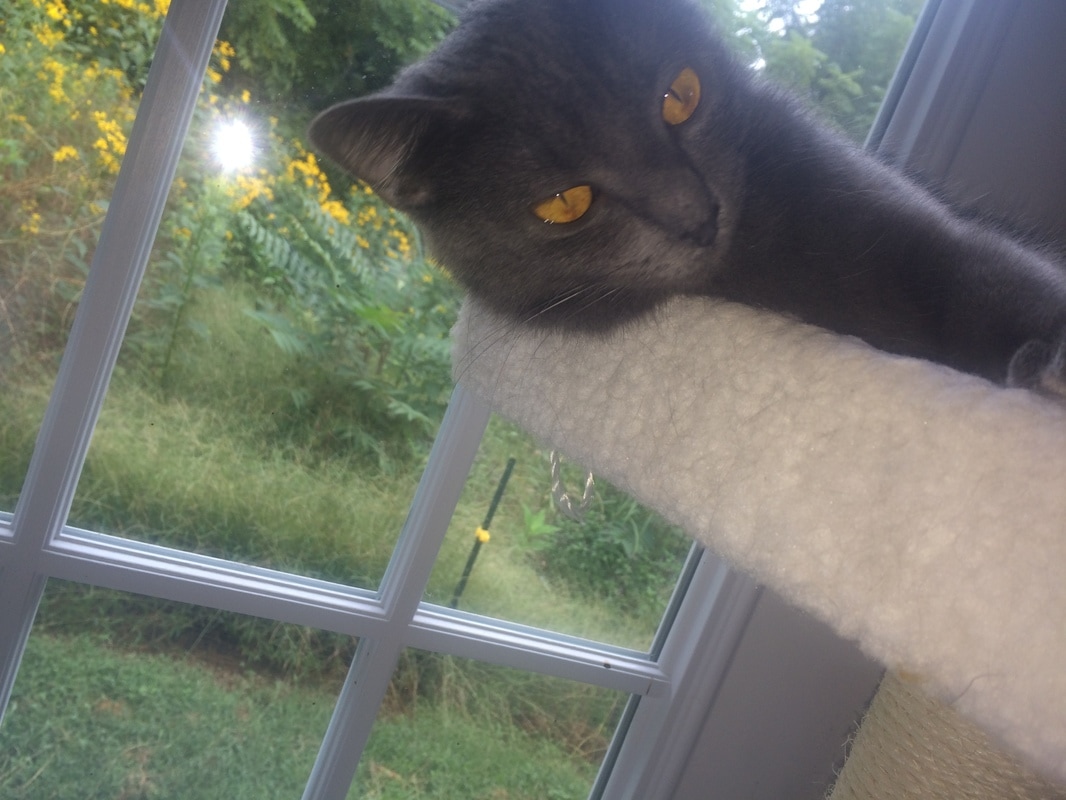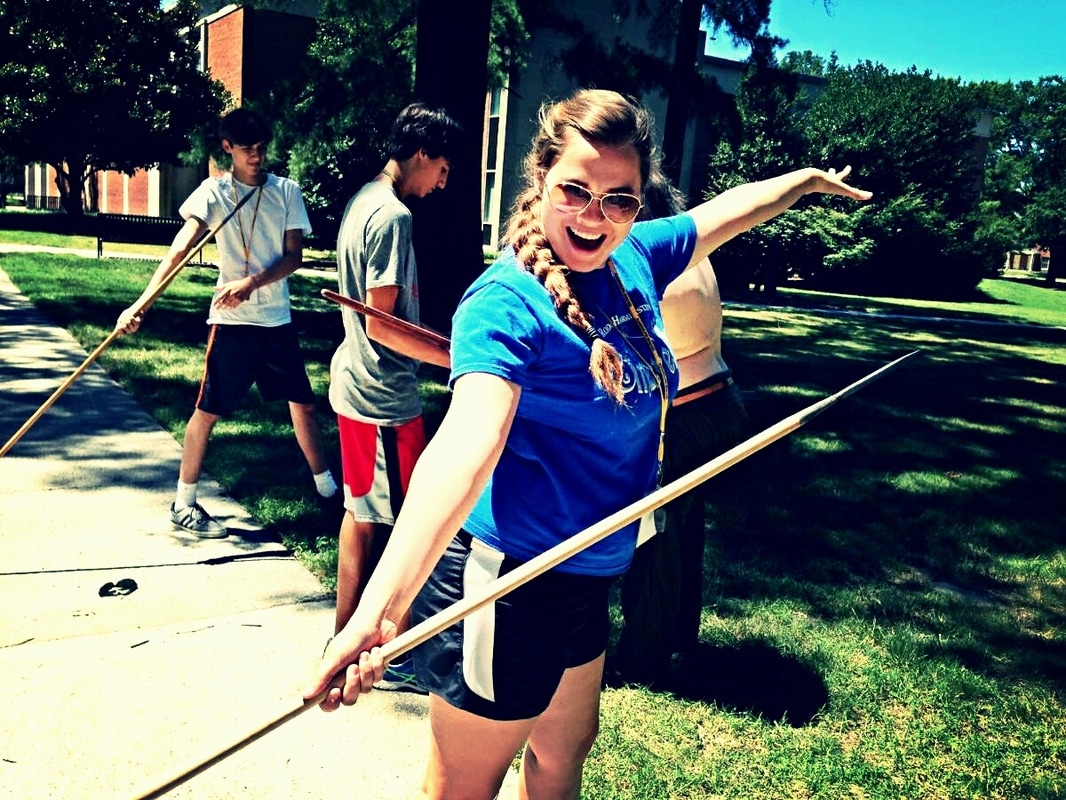|
Time is a fluid, funny thing at academy. The first few days, as we get to know each other and you go through cell phone withdrawal, will pass very slowly. As soon as you're acclimated and have made friends, time will zip by and you will find yourself, as if by magic, at the Closing Ceremony. However, moments of homesickness will flit in and out. So, as you are preparing for academy and deciding what to pack (consult the checklists!), take some time to spend time with your family, friends, and pets. By the end of academy, I miss my cats sooooo much. Bring pictures! Yes, I have five cats. :)
-Princeps
0 Comments
Be prepared for the time of your life! This is an experience like none other. I can't recall all the specific things that made GLA amazing, but I can say with certainty that those three weeks (which will also be your future three weeks) is like going on a fantastical whirlwind adventure that leaves you breathless and excited with every memory and every friend made.
I know the following comment will be absolute sacrilege, however, I hope that you will be receptive in what I wish to share: leave your cell phone and devices at home. I know, I know, I went through the exact same thought process as you are going through right now. As true as that may be, I challenge you take a step back and look at the here and now: where you are at, who you are with, what you are doing. Devote your time to creating bonds with the people who will be around you, including your roommate, your peers, your RAs (us!), and your teachers. You have this AMAZING opportunity to immerse yourself into a community that all shares a common bond: a love of Classics. Three weeks will surprisingly be gone like the wind, so... Experience these moments. Forage life-long friendships. Learn beyond. With that said, you will have the opportunity to do things the old-fashioned way: SNAILMAIL and CAMERA. That’s right! Some things to consider:
Some other things to consider bringing to make your experience at GLA amazing and comfortable:
Mox videbo, Kelly Hart (RA) salvete omnes
If you play a musical instrument and can bring that instrument to academy, please do. We have our own keyboard(!). In addition to the play, for which there will be an 'orchestra,' there are several academy activities that are always improved by the sound of music in the air, not to mention the impromptu performances that take place during our daily routines. Bring sheet music you'd like to share (we can make copies), also music stands and amps (if applicable). gratias magister Cavedo Salvete!
This summer, Magister Cavedo and I will be co-directing the Latin Academy play, which is Miles Gloriosus (The Braggart Soldier) by Plautus. This play features a solider who is completely full of himself and who gets what’s coming to him at the hands of his clever slave, his old man neighbor, and a couple of prostitutes. It will be amazing and fantastic! The play is a huge part of Latin Academy, and I encourage all of you to be involved in some way, whether you've ever tried theater before or not. (I mean, I had never done theater before, and here I am directing my sixth Plautus play!) Try out for a speaking part and maybe you'll play Philocomasium, the clever woman who helps trick the solider so she can be with her boyfriend, Pleusicles. Maybe a non-speaking part is more your style and you can be a silly cook, mocking the solider after he gets tricked. Maybe you're more musically inclined and you can bring your instrument to play to accompany the actors. Or maybe you're artistic and you can help out painting the set or designing the cover art for the program. There really is something for everyone! -Magistra Carroll χαίρετε, ὦ μαθηταί! Greetings, dear students! We may call ourselves the Gubernatoris Latina Academia Virginiae, but Latin won't be the only language you see in Ashland. Get ready to dive in to Ancient Greek! Following the examples of great Romans such as Cicero, Vergil, Augustus, and Marcus Aurelius, we will learn to read and love the language of the Ancient Greeks! The alphabet will be our first step to master: it may seem like a daunting hurdle, but I assure you that after our first day you’ll be reading Greek words like a pro - and you *might* have a new alphabet song stuck in your head. Okay, you definitely will. Our exploration will blossom into nouns, verbs, adjectives, and the like. We will aim to read short stories and some sentences - and even write in Greek ourselves! I have always found that the most rewarding part of learning ancient languages is getting to read authors in their original words - and the skills you pick up in Greek class will help you to do just that. We'll be looking at authors who talk about traveling and seeing new places - including Homer, Herodotus, Strabo, and Pausanias. By the way, have you ever seen maps based on the ancient geographers' descriptions of the world? Check out this one by my buddy Strabo: And as you know by now, we'll all be exploring provinces of the Roman Empire during Academy. You and your province-mates will have a chance to read some Strabo - in his original Greek words - and learn something special about your province. This may all sound like a lot, but in the end you will find you have a greater familiarity with Ancient Greek. Soon you'll stop saying "it's all Greek to me" and start saying "ἐμοὶ πάντα τὰ Ἡλληνικά." Get ready for our journey through Ancient Greek! - Magister Jefferson // Διδάσκαλος Ἰέπφερσον τέχναι βασιλέων Did you go to D.C. last year and see the Hellenistic Greek Bronzes? I did and I LOVED them. In fact I love all different types of Greco-Roman art and architecture.
In this class, we’ll be examining the art and architecture produced during the life of Alexander the Great and throughout the Hellenistic Kingdoms that succeeded him. Our main time period will be 323 B.C.E. (Alexander’s death) to 31 B.C.E. (Cleopatra’s death), and we will be looking at everything that once was part of Alexander’s INCREDIBLE empire. That means the regions of modern Greece, the Aegean Islands, Egypt, Jordan, Israel, Lebanon, Syria, Iran, Iraq, Turkey, Afghanistan, Pakistan, and Tajikistan. Ridiculous! We will also be examining the transition from Classical (507-323 B.C.E.) to Hellenistic period and we will see how the art and architecture reflects the political and social changes of the time. We’ll consider the ways in which Alexander brought his home of Macedonia to regions like modern Afghanistan. And of course we’ll see how all of these artistic and political elements culminate in my favorite city of all time - ROME! Believe it or not, even staunch Roman Republicans like Pompey acted a whole lot more like a Hellenistic King than you ever thought! The round shape and meaning of the Pantheon and the actions of famous Romans such as Sulla, Caesar, and Augustus might mean something a bit different after this class. We will be looking at some amazing pieces of art such as the Laocoön statue, the Great Altar of Zeus from Pergamon, and the Dying Gaul. You will see how so much of this period is marked by excessive emotion, passion, agony, wit, and fun. No statue shows calmness, no statue lacks a story. There is motion, there is play, and there is most certainly wild hair. You will learn about the various subcategories of Hellenistic art and tell the difference between the Baroque and Rococo styles. However, most importantly (in my opinion), you’ll have a great time learning about this underrated and understudied period of time. There is simply so much out there, and I cannot wait to explore it with you all! No pre-reading required, but come fully armed with curiosity, creativity, and an open mind (Macedonian helmet is optional). - Magistra Ghosheh Salvete Discipuli!
As you prepare to come to academy I wanted to address a couple of the things that I have noticed both as a student and in my previous year as an RA. The first thing I'd like to talk about is letter writing. When I attended as a student I only brought a couple stamps and ended up regretting it and needed to use stamps from my fellow students. As students, your correspondence with the outside world will primarily take the form of letters, and I very much enjoyed having access to that outlet. I highly encourage everyone to bring more envelopes and stamps then you think you'll want or need because a lot of people end up writing more than expected. Additionally I encourage you to get addresses for friends and family you might want to write so you can if the mood strikes you. You can also reach out to those same people to send you letters and care packages to help you settle in at academy. If you need the address it should be in your packet as well as on the side bar on this page. The second thing I'd like to address is clothing and laundry. First of all it has been mentioned previously that you should plan to dress in layers, as the dorms can get pretty cold and it will be very warm outside, but I'd like to reiterate it. Having a sweatshirt with you if you get cold will make your time at academy more comfortable. You should also plan on having some clothes that you don't mind getting dirty/sweaty as there will be some opportunity for athletic events, and some events will involve paint that might stain clothing. As far as how much clothing to bring to academy you will have ample opportunity to do your laundry (at least once a week). Please plan on doing laundry as it is much easier to pack for a week of clothes and wash them. Please note that you may want more than one outfit per day as you will get a lot of your clothes sweaty just walking around on campus and will want to wear different clothes in the afternoon than those that you wore to class. Make sure to bring the things you'll need to do laundry (including quarters to pay for the laundry machines if necessary). This is important and something some students have forgotten in the past. I highly recommend the tide pods or similar detergents that come prepackaged to make it easier to pack and use them at academy (especially for those of you who usually don't do your own laundry). I hope that this helps you in your preparation to come to academy, I can't wait to meet all of you! -Rob Williams Salvete Amici!
As I was a student at GLA, I can firmly say that I love academy more than Narcissus loved himself. I thought it may be helpful to compile a list of non-essentials as well as tips in preparing for one of the most unique experiences of your life. Most of these aren’t required of you, however, hopefully they will prep many of you to get in the right mindset as academy rapidly approaches. Some belongings you may wish to have at your disposal:
Although you aren’t expected to know much about the various classes you will take, brushing up on some Latin grammar and vocabulary is not a bad idea. Additionally, if you have never learned scansion, it may be a good idea to try and understand the basics so that you won’t feel overwhelmed when it’s presented in some of your classes. Many of you will also have a roommate for the first time at academy, so I encourage you to be both patient and openminded as you will be living with her/him for three weeks! Academy is roughly a month away which may be extremely exciting or terrifying. Regardless, I hope that you all enter academy with an open mind, ready to learn! We're not lying when we say that this will be an incredible experience that you may look back on and think, “O TEMPORA! O MORES!” as long as you are willing to enjoy the experience. *mic drop* - Sallie Blanks, RA P.S. I’ve included a photo to hint at one of my favorite academy excursions. Sorry for the glaring filter- that was a thing a couple years ago. Mistakes were made. *Magister Gallagher waves hello*
Latina Loquenda! Latin must be spoken! It's the title of my course, as well as my general outlook towards the Latin language. We spend so much time *reading* Latin that sometimes it's easy to forgot that this language was spoken by a diverse range of people over a vast period of time. Not everyone in the Roman world had the same mastery of the Latin language as Ovid (really, perhaps no other individual did, but that's a conversation for another time...). When we think of Latin, we always dwell on the highest caliber authors, not on how a regular ol' pleb might have used the language. It's my goal to teach you to use Latin as a spoken language. While you already know how to *read* Latin, I'm going to help you produce your own Latin sentences on the fly! Ultimately, you'll be participating in some full-immersion activities where we will only speak in Latin. You'll soon be able to talk about your daily life, the world around you, and the things you are doing IN LATIN. I'll also teach you how to buy and sell things IN LATIN. Are you scared or intimidated by that? You shouldn't be! You already know Latin. I'm just going to help you use what you already know in a new way! I expect absolutely no experience with spoken Latin before you get here, and I'll teach you everything you need to know from square one. Mistakes are going to happen all the time. You'll mess up, and I'll mess up too. You'll forget words, and I'll forget words too. We'll learn and get better, always trying our best. The important thing is that we communicate with each other. After all, that's the whole purpose of language! This summer I will be teaching an interdisciplinary course about Greek and Roman art and literature in the age of the Julio-Claudian emperor Nero called oderint dum metuant. In this class we will (1) practice reciting Latin poetry with selections from Lucan's epic Bellum Civile, (2) situate the elaborate and exquisitely decorated fresco mural paintings that are preserved in Nero's domus aurea within the larger context of ancient Greek and Roman painting, (3) cultivate Latin left-to-right reading strategies and apply them to Pliny the Elder's anecdotes about Greek artists, and (4) develop the ability to articulate a specific written position as economically as possible.
Each class will begin with a brief selection from Lucan's Bellum Civile, which is an epic poem about the civil war between Julius Caesar and Pompey the Great that was written during the early years of Nero's reign, in order to develop an understanding and appreciation of the artistic qualities of Roman poetry. After an introduction to the domus aurea on the first day, we will spend several classes investigating the surviving visual evidence, as well as scientific analyses and reconstructions, of Greek and Roman tomb, panel, statue, and wall paintings in order to shed light on the function, significance, and reception of Neronian art in first century Rome. Each lesson on ancient painting will be accompanied by a short Latin anecdote about a Greek artist from Pliny the Elder's post-Neronian Natural History that will reveal imperial Roman artistic tastes and aesthetic notions of ancient Greek and Roman art and also provide an example of accessible and delightful Latin prose for the practice of left-to-right reading strategies. Finally, we will end each class with a short writing exercise, i.e. less than or equal to one sentence, related to the questions raised by the materials covered in the day's lesson so that you may improve your ability to articulate an original, direct, and targeted position concerning the relevant images, texts, and issues with the utmost clarity, specificity, and nuance. There are no prerequisites or assignments to complete before you arrive, and, other than the sufficiently advanced grasp of Latin grammar and syntax required to earn admission to the Latin Academy, I assume no prior knowledge of any of these topics, authors, or works. I imagine that much, if not all, of what I described above might be entirely new to you and that is totally okay. It is my hope to introduce you to new ideas and concepts related to what you already know so that you enjoy the opportunity both to acquire new knowledge and also to deconstruct whatever preconceptions you might have about Nero, art, or literature. I am looking forward to meeting and getting to know all of you. Latin Academy is my favorite but it wouldn't be a thing if it weren't for the amazing and fantastic students we have the opportunity to teach. I hope the end of your school year goes well and that you enjoy what little vacation you get before Latin Academy begins. ex animo magister Cavedo |
Salvete!This blog will document the MMXVII session of the Virginia Governor's Latin Academy. After elections are held, the aediles will be responsible for its upkeep. Contact Us
Email: valatinacademy@gmail.comOffice Phone: (804) 496-1589 Mailing Address: (student's name) c/o Governor's Latin Academy Randolph-Macon College P.O. Box 5005 Ashland, VA 23005 GLA Checklists
Download these and use them to help with packing: GLA Clothing Checklist GLA Essentials Checklist GLA School Supplies & Optional Checklist Suggested Texts-
NOT REQUIRED Again, these are not required and I would only get one from each category, if any. Latin Lexicons a. Conversational Latin for Oral Proficiency b. Cassell's Concise Latin-English, English-Latin Dictionary c. Collins Latin Concise Dictionary Greek Texts/Lexicons a. Homeric Greek: A Book for Beginners b. Liddell and Scott's Greek-English Lexicon Abridged c. Pocket Oxford Classical Greek Dictionary Translation Texts a. Iliad b. Thyestes Daily Life Books a. Everyday Life in Ancient Rome b. Peoples of the Roman World c. A Day in the Life of Ancient Rome d. Daily Life in the Roman City Vestes Romanae
You will need Roman clothing for several of our activities. You might not always have much time between these events, so you might want to bring more than one outfit. Patterns An Overview I & II Roman Dress Simple Tunica, Stola, and Palla Patterns Legio XX's Civilian Clothing Another Simple Dress Pattern Greek Patterns Simple Tunic and Toga Patterns Peplos Pattern Legio XX's Military Clothing Officers of the Academy
Censors: Xavier W. and Frances H. Consuls: Hannah K. and Sayeed A. Praetor: Jake B. and Claire M. Aedile: Britney P. and Caroline M. (that’s us!) Tribune: Ana S. and Min Jae K. Quaestor: Anna L. and Charlie M-B |






